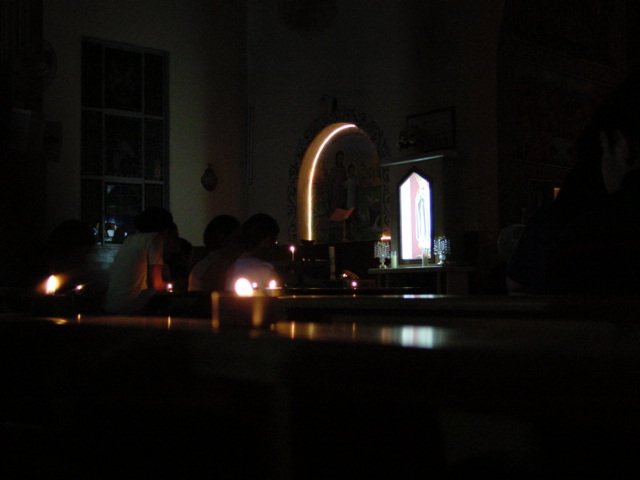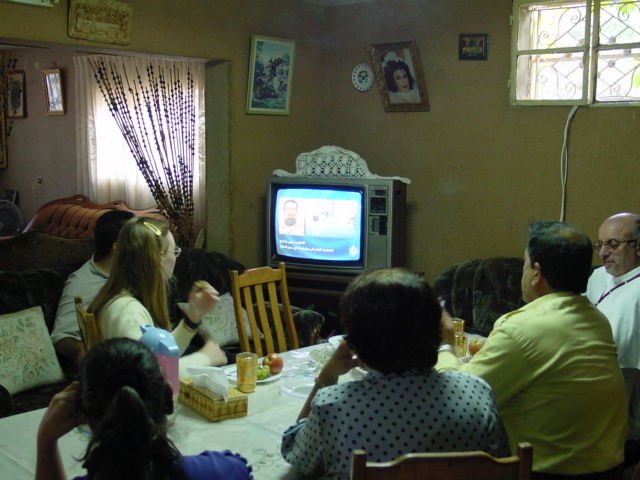The Serbian Intifada
Prayer vigil in the Roman Catholic Church of Visitation, Zababdeh.
For a couple of days, the news from Serbia has removed the Middle East from the front page. Here in Palestine, it sat on the TV as a striking counterpoint to the escalating violence in this region. We saw images of a huge public outcry, massive protests in Belgrade. Mostly peaceful, but we also saw angry mobs, buildings being burned, stones being thrown, and Milosevic supporters being attacked in broad daylight. An entire regime fell, yet nobody was killed. Thank God. The Western world applauds the nationalist Kostunica's perserverance, and his supporters are heralded for ridding the world of the hated Milosevic in their justifiable search for peace. And a moment later, images of massive protests among Palestinian people in Israel, in the West Bank and Gaza, and in Lebanon. We saw angry mobs, buildings being burned, stones being thrown. But the outcome here is tragic, with over 80 dead, and hundreds wounded. Hospitals are so overcrowded that patients are being taken to Jordan and Egypt. Homes and buildings are being bombed. The Western world condemns Arafat as a manipulative charlatan throwing bodies on the pyre for his own political gains.
The parallel, of course, is not clean, but the two images side by side create a powerful contrast in the events of our world. We urge you to keep up-to-date with the situation. Visit the web, read as much as possible, learn what you can, and think for yourself, to reach your own conclusions.
Now is a critical time, and the impact on the Christian community is cause for deep concern. The Christian community, as you know, is a minority in Palestine. But it is Palestinian, and thus its future is intertwined with that of its brothers and sisters and their long struggle for justice. And now, thanks to the likes of Ariel Sharon (who, it should be noted, was indirectly condemned for the Israeli massacres at two Palestinian Christian refugee camps in the 1980s) and the Western press, the conflict has been successfully portrayed as that of Jewish versus Muslim, Wailing Wall versus Mosque, "Jewish and Democratic" state versus "Islamic terrorist" upstart. Parts of the Muslim world, too, seeks to define the conflict in religious terms, as evidenced by the attacks and kidnappings initiated by Hezbollah, signs and placards that read "52 years of occupation of Muslim land." The Christian community has no place here, it seems, in the land of Christ's birth. The American church has not sought to build up the church here, and instead has contributed to its struggles through a failure to acknowledge fellow believers in the Holy Land, and overwhelming and unqualified political and financial support of the state of Israel.
Watching the news with a Palestinian family
There is deep need for a theology to make sense of this conflict. We seek one that hears Christ's words that the one without sin should cast the first stone (John 8), whether that stone is a stone or a rubber bullet. One hears Christ's words that the response to violence is repentance (Luke 13:1-3) - not a turning away from the world for selfish reasons of personal piety, but a metanoia, a conversion of the self, one in which we open up before God and are made aware of our own implication in this violence (timely for us all on Yom Kippur weekend) and turn out to the world in love and grace. One that seeks reconciliation (Rom. 5:10), not simply political peace or convenient compromise. One that recognizes that Christ breaks down all barriers, uniting the church in solidarity as one body (I Cor. 12:12-13). And one that puts an end to conflict realizing that the victory has already been won, that Christ's death on the cross has finally, and fully, saved us from ourselves (Col. 1:19-20).
Our friends and family, we hope you take these words to heart, in whatever ways you can, whatever your faith or your politics. Turn out to the world, acting in concrete ways for justice and mercy. Those of you in the West wield power unimaginable, particularly in relation to the peace in the Middle East. Reach your hand across the barriers that divide in solidarity with those who feel abandoned by the rest of the world. And pray. We continue to greet you in...
Salaam,
Shalom,
Peace,
Marthame and Elizabeth
P.S. Even with all of this, things remain calm in Zababdeh, thank God. Barely a ripple has passed through this village. Perhaps it is because the people are frightened, perhaps it is because this is a rural farming village far removed from Ramallah, Nablus, Bethlehem, Jerusalem, Gaza, Hebron, Lebanon, Nazareth. We have seen the conflict as closely as you have, through the web and on TV. But the fuller story is one we have been hearing from friends working in these places.


